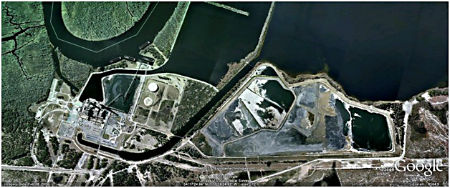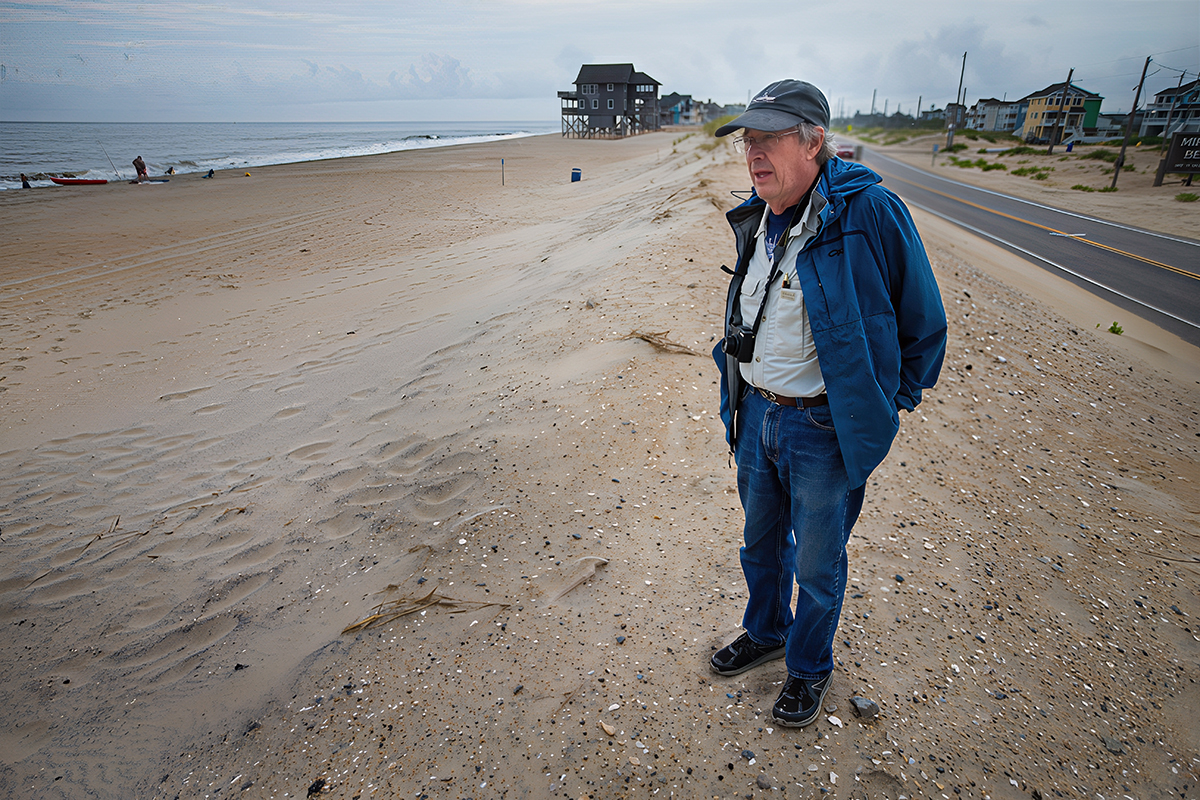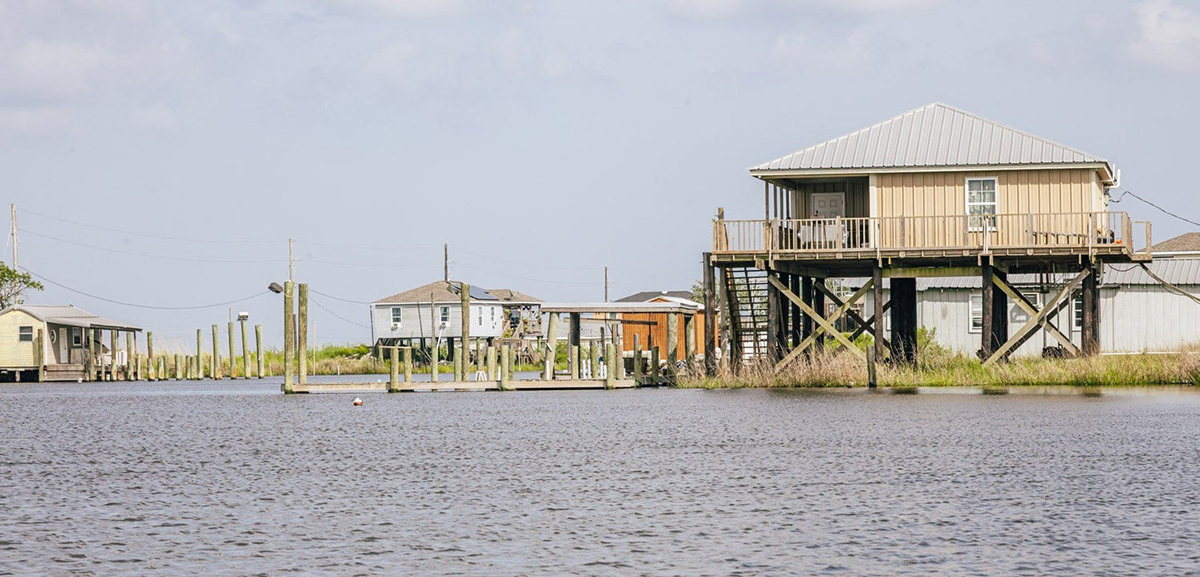 The Sutton plant near Wilmington is one of the four “high-risk” sites identified by Duke Energy as priority for clean up. Photo: Cape Fear Riverkeeper |
RALEIGH — On the heels of an announcement by Gov. Pat McCrory that he’ll sign the recently passed Coal Ash Management Act, regulators stepped up pressure last week on Duke Energy over groundwater contamination near its L.V. Sutton Plant near Wilmington.
Tom Reeder, director of the N.C. Division of Water Resources, sent a formal notice of violation to Duke Energy on Aug. 26.
Supporter Spotlight
In a statement accompanying the announcement of the violation letter, Reeder said his division was doing what it could ahead of the outcome of a lawsuit that the state filed over groundwater contamination at all 14 of the utility’s coal ash sites.
Reeder said groundwater monitoring wells at Sutton showed that levels of boron, thallium, selenium, iron, manganese and other contaminants were higher than state standards. Duke has 15 days to respond to the notice. The company could face penalties of up to $25,000 a day if it fails to begin the cleanup.
“We said in court last year that the groundwater around the Sutton Plant was contaminated by Duke’s coal ash ponds,” Reeder said. “But as the legal process for stopping the violations drags on, we will take what action we can using our existing authority to hold the utility financially accountable for damaging the public resource.”
Kemp Burdette, the Cape Fear Riverkeeper, said it’s unclear why the state has decided to take that kind of action after it filed a lawsuit over the contamination last year.
 Kemp Burdette |
“It’s usually a first step,” he said of the notice of violation. “It’s more of a low-level enforcement action. A lawsuit is a much more serious response.”
Supporter Spotlight
Burdette’s worry is that the state’s recent notice might even slow down any cleanup at Sutton or set up an unsatisfactory legal settlement akin to one the state offered Duke last year but withdrew after the massive coal ash spill on the Dan River near Eden in February.
“It seems too little, too late,” Burdette said. “The state has known about the contamination for years and they’re during this now?”
Testing by researchers with Wake Forest University at Sutton Lake, a popular fishing spot near the three coal ash basins, has shown high levels of selenium and other heavy metals, which the scientists say is migrating into the lake from the groundwater.
In response to the state, Duke officials point to the closing of the Sutton ponds, which would include moving the ash to a lined landfill, as a solution to the groundwater concerns.
 Erin Culbert |
“The company is moving swiftly to permanently close the Sutton ash basins, which will ultimately resolve this issue,” Erin Culbert, a Duke Energy spokeswoman, wrote in an email response. “The majority of exceedances at the Sutton Plant are for iron, manganese and boron, with other sporadic exceedances that do not appear regularly.”
Culbert said the company added two new groundwater monitoring sites between the ash basins and the wells that Cape Fear Public Utility draws drinking water for the Flemmington community. Monitoring has shown that groundwater from Sutton is moving in the direction of the wells.The company has paid for a new municipal water line to the area. Culbert said the new monitoring sites will provide more information for Duke and the utility while the water line is under construction.
“We’ve seen one exceedance of iron, and all other parameters are well within groundwater standards,” she said.
Over the last several months, Duke had been conducting engineering and scientific studies on geology, groundwater, soils and other aspects of the Sutton site to devise a closure plan, Culbert said. “In the meantime, the state legislation was passed that will require ash to be excavated,” she wrote in an email. “We are working now on the excavation plan and what those next steps will involve.”
What to do with all that ash is a major question. “We have begun the work to explore alternatives for where the excavated ash could go,” Sulbert wrote. “This includes evaluating options for both on and off-site lined landfills or lined structural fills, where ash serves as a replacement for fill material. No decisions have been made at this point.”
New Bill Drives Schedule
Clean-up plans at the Sutton site and at coal ash ponds in Asheville, Gaston County and Eden, are included in the bill and are similar to those recommended by McCrory and Duke Energy.
The four sites are categorized as “high-risk” under the legislation. Cleanup, including dewatering and moving the ash to a lined landfill, is required to be completed by Aug. 1, 2019.
The bill gives the N.C. Department of Environment and Natural Resources, or DENR, until Dec. 31, 2015, to prioritize the closure of the remaining 10 sites and the authority to add any of them to the high-risk list.
The bill mandates that ponds considered “intermediate risks” be closed by Dec. 31, 2024. Duke would have until 2029 to clean up low-risk sites. All sites would be monitored for 30 years after closure.
The legislation, which runs 52 pages and includes dozens of separate provisions, almost didn’t happen.
Even before the session started in May, legislators promised that a coal ash bill would be a top priority for the session. But the bill appeared dead after a committee of legislators charged with working out disagreements between the state House and Senate versions was disbanded at the end of July.
 To the right of the Sutton plant are the three coal ash ponds next to Lake Sutton. The U-shaped body of water at the top, left corner of the aerial photo is a section of the Cape Fear River. Photo: Google |
That prompted the McCrory administration to move forward without a bill. On Aug. 1 the governor issued an executive order, which among other things ordered DENR to start an immediate assessment of drinking water wells near coal ash ponds.
Over the final weekend of the session, prospects for a coal ash bill suddenly shifted after the Senate offered compromise language further defining what type of ponds could be identified as low risk. Duke could be allowed to cover such ponds with a cap and leave the ash in place. The compromise, though, prevents ponds where the ash sits below the water table from being classified as low risk.
The compromise bill passed quickly through both chambers on Aug. 20, the last day of the legislative session, first in the House by a vote of 84-13, and then in the Senate, 38-2.
Last week, McCrory said he would sign the bill, but is considering a constitutional challenge of a provision that reduces the executive branch’s role in a commission the bill creates to oversee the cleanup. The Coal Ash Management Commission would be set up in the N.C. Division of Emergency Management at the Department of Public Safety, and not in DENR, and most of its members would be appointed by the legislature, not by the governor.
Senate and House leaders have already named five of their six appointments to the nine-member commission through a provision in a separate appointments bill. McCrory has not announced any commission appointments.
In addition to the new commission, the bill provides $1.75 million for 25 new positions at DENR. It also adds five positions at the N.C. Division of Emergency Management for support work for the commission.
Groundwater Debate
During the debate on the bill in the House, Rep. Rick Catlin, R-New Hanover, one of the main House negotiators, urged his colleagues to support the bill to move the state forward in dealing with coal ash.
 Rep. Rick Catlin |
“I would not support it if I thought there was any environmental issue we had missed,” Catlin said. “There will be some things we’ll have to solve technically in the future, but I think we’re doing a good thing.”
New requirements, he said, including tighter monitoring of all sites and a clay cap and liner for any low-risk sites helps protect groundwater. “The latest issue of this bill ensures that our groundwater issues will be addressed,” he said.
While it passed with strong support, the bill has come under criticism from environmental groups, which say that it still doesn’t go far enough on groundwater and could roll back some existing protections.
Some are counting on predictions that there will be more chances to get it right on coal ash. Bill sponsors said at the end of the session they expect further legislation as soon as the next session.
In a statement issued after final passage, Molly Diggins, director of the N.C. Sierra Club, said one bill won’t solve the problem. “Without this legislation, coal ash would have remained essentially unregulated, an untenable position for North Carolina residents,” she noted. “Still, today’s action does not go far enough to prevent more contamination of our treasured water resources.”
Burdette said he’s concerned about the effect of what’s been passed so far, especially one provision that would allow DENR to include seeps from coal ash impoundments as part of a facility’s wastewater permit, making what is now an illegal discharge permittable.
He said in addition to not being able to accurately measure their flow, the seeps, are often at the lowest part of the ponds. “The seeps are coming right off the bottom, where the contaminants are the worse and are all mixing together,” Burdette said.
Samples he’s drawn from the Cape Fear River near seeps at Duke’s Moncure plant have shown exceedances in chromium, arsenic, lead, aluminum and mercury, he said. “It’s a toxic cascade of heavy metals.”
 Frank Holleman |
Frank Holleman, a senior attorney with the Southern Environmental Law Center who has worked on many of the coal ash cases, said the seep language is one more indication that the bill could do more harm than good.
“The bill is, if anything, a step backwards,” he said. “There’s not one thing in it that Duke has to do that it has not already said it would do.”
Holleman said once plans are announced in the communities with coal ash impoundments, he expects the new coal ash commission and DENR will “get an earful” at public hearings if they don’t require complete cleanup.
He said many of the bill’s provisions weaken protections by giving DENR and the commission too much freedom to waive requirements and standards. Even worse, he said, is the new processes could end up extending the amount of time it will take to clean up the sites.
“This could drag out for years,” Holleman said.
Legal Challenges Ahead
 Rep. Chuck McGrady |
McCrory is not the only person considering a legal challenge to provisions in the coal ash bill.
One provision in the legislation is aimed directly at a March ruling by Superior Court Judge Paul Ridgeway that Duke Energy must take immediate action to stop groundwater contamination at coal ash sites, including removal of the source. That case, one of two major lawsuits on coal ash working through the courts, is likely to see further action this fall as a result of the new law.
D. J. Gerken, an attorney with the law center’s Asheville office, said he thinks the provision will prove unsuccessful. He said the law center intends to file a brief on the matter and expects that Duke and possibly others will as well.
House sponsors said they pushed for the language on the Ridgeway ruling because of the expectation that the ruling will be overturned on appeal.
Rep. Chuck McGrady, R-Henderson, the chair of the House negotiating team, said during the House debate that he and others believe Ridgeway went too far in requiring removal of the source of groundwater contamination, a mandate that could reach beyond coal ash basins and require costly cleanup at some municipal landfills.







